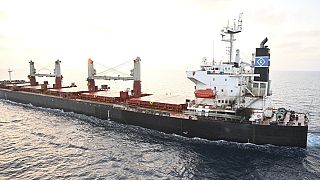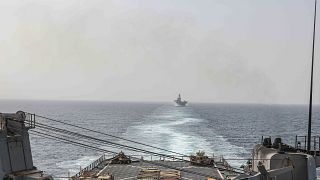European Union
European Union member states are set to launch a naval mission in the Red Sea by mid-February, aiming to protect ships from attacks by Yemen's Houthi militants.
Houthi-controlled territories in Yemen have become a hotspot for maritime unrest, with attacks targeting ships perceived to be associated with Israel.
The Houthis claim solidarity with the Palestinians amid the ongoing Israeli military offensive in Gaza, framing their actions as a response to what they view as a genocide in the occupied Palestinian territory.
Josep Borrell said the EU operation would be named Aspides - meaning protector - and its mandate would be to protect commercial and intercept attacks, but not take part in strikes against the Houthis.
Approximately 40% of EU trade with Asian and Middle Eastern countries traverses Red Sea waters, making the region strategically vital for the EU. The mission's focus on maritime security aligns with the EU's broader efforts to safeguard economic interests and ensure safe navigation through critical trade routes.
France, Greece and Italy have shown interest in leading the mission, with seven countries so far indicating they would be willing to send naval assets, diplomats said, adding that it would be based on existing EU missions in the region.
The operation would initially see three vessels under EU command. France and Italy already have warships in the region, and Germany plans to send the Hesse frigate to the area, diplomats said.
The launch of the Aspides mission marks the EU’s decision to diverge from the US-led mission launched in December, which has seen the U.S. and Britain launch airstrikes on Houthi positions, reflecting Europe's reservations about being under Washington's command.
The EU faces the risk of inadvertently escalating tensions in the region, given the complex geopolitical dynamics involving multiple stakeholders, highlighting the need for meticulous planning and diplomatic finesse in navigating the turbulent waters of the Red Sea.
Maritime security is a primary concern as the Red Sea is a critical global trade route between Africa and Asia, connecting the Mediterranean Sea to the Indian Ocean.
The conflict has prompted shipping firms to avoid the region, opting for a lengthy detour around Africa. This disruption, impacting over 12% of global trade, poses inflation and price-rise risks for import-heavy African countries like Egypt, Ghana, Ethiopia, and Nigeria.
While circumventing the Red Sea adds significant sailing time and costs, it opens opportunities for African nations to potentially benefit from increased maritime traffic and trade diversions.













01:43
Prices soar as people in Gaza face severe food shortages
01:49
Analyst says ICC arrest warrants unlikely to end Gaza war
01:03
Netanyahu: ICC “biased court”, arrest warrant against me "black day in history"
02:20
Horror and destruction of Israel's war illustrated by Gaza artists
01:16
Four Ghanaian UN peacekeepers wounded in rocket strike in Lebanon
01:48
Meet one of the teams patrolling Senegal's waters to rescue migrants on small boats